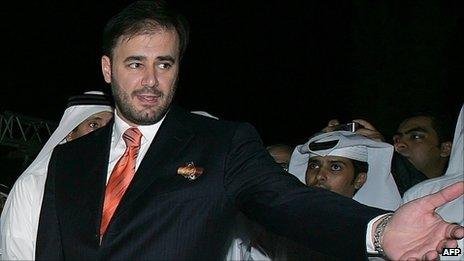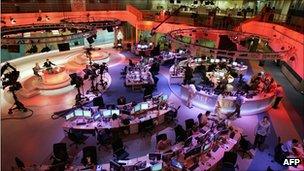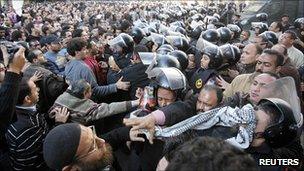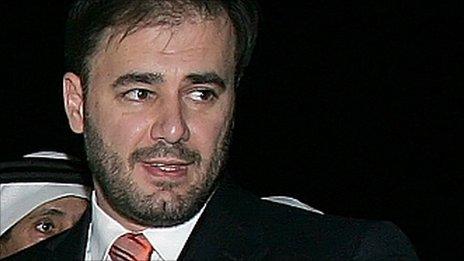Al-Jazeera boss steps down : strains with Qatar royals?
- Published

Sources say Wadah Khanfar was asked to resign by Qatar's royal family
On 20 September, Wadah Khanfar unexpectedly resigned as director general of the al-Jazeera satellite television channel after eight years in the post. He gave no reason for his decision.
As usual with al-Jazeera, the rumour mill has been turning feverishly ever since.
To most observers, the move came as a surprise as Mr Khanfar was widely regarded as a successful chief who during his eight-year tenure managed to cement al-Jazeera's reputation as a world class international news network.
But sources close to the royal court in Qatar said the move had been expected for days and the only surprise was news that his replacement was to be a hitherto unknown prince from the Qatari royal family with a professional background as a gas executive and apparently no experience in journalism.
In an interview following his announcement, Wadah Khanfar said he left the station voluntarily, although well-informed sources say in fact he was asked to leave by the royal family. Several other high-profile al-Jazeera staff have also left the network in recent days and weeks.
Various explanations for the shake-up have been put forward, including Mr Khanfar's purported rivalry with Azmi Bishara, the Palestinian former Knesset member who is now director of the Doha Institute; an attempt by the Emir of Qatar to "take back" the network from the Muslim Brotherhood with whom Khanfar has often been linked; and, of course, the Wikileaks scandal which embarrassed Khanfar and al-Jazeera generally when it was suggested that he took steps to change the network's output in order to placate the USA.
Mr Khanfar's resignation announcement came as the Emir of Qatar, Sheikh Hamad bin Khalifa Al Thani, left for the UN General Assembly session in New York, which some interpret as a sign to Washington that he has taken control of the network so he might calm down anti-US feeling in the wake of the imminent controversial vote on Palestine.
Open door policy
The relationship between al-Jazeera and the Qatari royal family has always been a source of controversy. Al Jazeera has always operated under Qatar's political and economic umbrella, but the network's critics claim the relationship goes deeper and the channel is really only another arm of the emir's government - something network spokesmen have always strenuously denied.

Al Jazeera's motto is: The opinion and the opposing opinion
What's clear is that the network's outlook often closely mirrors Qatar's own agenda, a country whose foreign policy can best be summed up as a delicate attempt to try and get along with everyone at the same time. From its inception, al-Jazeera has had a similar open door policy. Its motto is: "The opinion and the opposing opinion".
Qatar is the only country in the Gulf with ties, albeit low-level ones, with Israel. Al Jazeera was the first Arab channel that allowed Israelis to speak uncensored. Qatar has had an active political and diplomatic role in Arab and Muslim hotspots like Lebanon, Darfur, Yemen and Libya. Al Jazeera focuses closely on these same troubled areas.
But as al-Jazeera's influence has grown, Qatar's regional ambitions have also become increasingly complex, especially in Libya, where the emir is deeply committed and has taken a risky bet backing an Islamist faction within the anti-Gaddafi forces, and in Bahrain, where in March he deployed troops to help quell the uprising.
Double-edged sword
Al Jazeera has played a leading role in the Arab Spring, teaching demonstrators tactics and strategy, giving rebel leaders a platform and airing powerful user-generated content off the Internet that galvanised millions to take to the streets.

Al Jazeera helped unleash forces of change across the region
But the network has always been a double-edged sword, where anything can be said and heard, and as Qatar takes its first steps into an extremely volatile Middle East, the network's influence may overwhelm the emir's interests in other areas.
Contrary to western popular perception, the emir is neither a Westerniser nor a democrat but a moderniser who seeks at the same time to run his state on Islamic principles adapted to current international circumstances.
He supported the revolutions in North Africa because he views dictators like Ben Ali and Gaddafi as un-Islamic, because he wants to promote the emergence of other modern, Islamic states like his own, and because he wants to promote his own position as a Muslim leader, a crucial role in Islam.
His first priority has always been the security of Qatar, which is one of the reasons he established al-Jazeera in the first place. Like most Arabs, he views US policies in the Middle East as the biggest threat to regional security, so influencing Washington is a major objective, which for a small country like Qatar is a formidable challenge. But al-Jazeera is the ideal tool for provoking an international reaction and the kind of aggressive coverage the network produced under Wadah Khanfar served him well.
Now as the forces of change al-Jazeera has helped unleash across the region look increasingly out of control, it seems the Emir is intent on bringing the network to heel. But no matter who heads al-Jazeera, they will not be able to turn back the clock or stuff the information genie back in its bottle.
Hugh Miles is a writer and journalist living in Cairo. He has written a history of the network called Al-Jazeera: How Arab TV News Challenged the World.
- Published20 September 2011

- Published20 February 2023

- Published25 February 2011